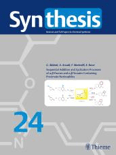
SYNTHESIS-STUTTGART
Scope & Guideline
Pioneering Research in Catalysis and Synthesis Since 1970.
Introduction
Aims and Scopes
- Innovative Synthetic Methodologies:
The journal emphasizes the development and application of novel synthetic methodologies, including palladium-catalyzed reactions, photoredox catalysis, and organocatalysis, aimed at enhancing efficiency and selectivity in organic synthesis. - Asymmetric Synthesis:
A significant focus is placed on asymmetric synthesis techniques, which are crucial for producing chiral compounds with high enantiomeric purity, particularly for applications in pharmaceuticals and agrochemicals. - Multicomponent Reactions:
The journal highlights advancements in multicomponent reactions that allow for the efficient construction of complex molecular architectures from simple starting materials, thus streamlining synthetic pathways. - Green Chemistry and Sustainability:
There is a growing emphasis on sustainable practices within synthetic chemistry, including the use of green solvents, recyclable catalysts, and environmentally benign processes. - Functionalization of Heterocycles:
The synthesis and functionalization of heterocycles remain a core area, reflecting their importance in drug discovery and material science. - Total Synthesis of Natural Products:
The journal also features studies on the total synthesis of natural products, showcasing the application of synthetic methodologies to create biologically active compounds. - Catalyst Development:
Research on the development of new catalysts, particularly those based on earth-abundant metals, is increasingly relevant, addressing the need for more sustainable catalytic systems.
Trending and Emerging
- Photoredox and Visible-Light Catalysis:
There is a significant increase in research focused on photoredox catalysis, utilizing visible light to drive chemical reactions, which is seen as a sustainable alternative to traditional methods. - Electrochemical Synthesis:
Electrochemical methods are gaining traction as a key area of interest, reflecting a broader trend towards greener synthesis that minimizes solvent use and waste. - Radical Chemistry:
Papers exploring radical chemistry, including radical cyclizations and radical functionalizations, are on the rise, highlighting innovative strategies to construct complex molecules. - Sustainable and Green Chemistry Practices:
An increasing number of publications emphasize sustainable practices, including the use of recyclable catalysts and environmentally friendly reaction conditions. - Multicomponent Reactions and Cascade Processes:
Research on multicomponent reactions and cascade processes is trending, showcasing their efficiency in constructing complex architectures from simple precursors. - Functionalization of Complex Molecules:
There is a growing focus on the functionalization of complex molecules, particularly in medicinal chemistry, which is essential for the development of new therapeutics. - Machine Learning and Computational Chemistry:
The integration of machine learning and computational techniques for predicting reaction outcomes and optimizing synthetic pathways is emerging as a notable trend.
Declining or Waning
- Traditional Reaction Conditions:
There is a noticeable decline in papers focusing on traditional reaction conditions that do not incorporate modern advancements such as green chemistry principles or novel catalytic approaches. - Simplistic Synthesis Techniques:
The journal has seen fewer contributions centered on simplistic or one-dimensional synthesis techniques, as there is a shift towards more complex and multifunctional synthesis strategies. - Conventional Solvent Use:
Papers reporting on conventional solvent use in organic synthesis have decreased, indicating a trend towards solvent-free or green solvent methodologies. - Non-Catalytic Reactions:
There is a waning interest in non-catalytic reactions, as the field increasingly prioritizes catalytic processes that enhance efficiency and reduce waste. - Traditional Natural Product Synthesis:
While the total synthesis of natural products remains relevant, works focusing solely on traditional methods without innovative approaches are appearing less frequently.
Similar Journals
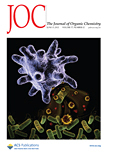
JOURNAL OF ORGANIC CHEMISTRY
Advancing Organic Chemistry Through Innovative ResearchJournal of Organic Chemistry, published by the American Chemical Society, is a prestigious peer-reviewed journal dedicated to advancing the field of organic chemistry. With an ISSN of 0022-3263 and an E-ISSN of 1520-6904, this journal has established itself as a key platform for disseminating high-quality research since its inception in 1936. Residing in the Q2 category for Organic Chemistry as of 2023, it ranks #64 out of 211 in Scopus, positioning itself within the top 69th percentile of its field. Researchers and professionals can access vital findings and innovative methodologies that drive the understanding and application of organic chemical principles. Although the journal is not open access, it remains a crucial resource in academia and industry, contributing significantly to the scientific community's knowledge base. For detailed insights and cutting-edge research, the journal continues to be an essential read for those engaged in the dynamic and evolving landscape of organic chemistry.

ORGANIC SYNTHESES
Connecting Researchers through Organic Synthesis InsightsORGANIC SYNTHESES is a prestigious journal dedicated to the field of organic chemistry, published by ORGANIC SYNTHESES INC. Since its inception in 1946, the journal has served as a vital platform for researchers, educators, and practitioners in chemistry, showcasing significant findings and methodologies that advance the discipline. Although it currently does not offer open access, it is recognized for its rigorous peer-review process and its contribution to standardizing organic synthesis methods. With an ISSN of 0078-6209 and an E-ISSN of 2333-3553, the journal's impact reflects its quality, with a current Scopus ranking placing it in the fourth quartile in both Organic Chemistry and Physical and Theoretical Chemistry. This positioning underscores its critical role in fostering knowledge and innovation within these fields. Researchers and students alike will find ORGANIC SYNTHESES an essential resource for staying informed on contemporary practices and discoveries in organic synthesis.
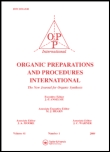
ORGANIC PREPARATIONS AND PROCEDURES INTERNATIONAL
Transforming Knowledge into Action in Organic SynthesisORGANIC PREPARATIONS AND PROCEDURES INTERNATIONAL is a prominent journal in the field of organic chemistry, published by Taylor & Francis Inc. With an ISSN of 0030-4948 and an E-ISSN of 1945-5453, this journal has been a vital resource for researchers since its inception in 1971, showcasing a broad range of methodologies, protocols, and innovative applications within organic synthesis. Although categorized in the Q4 quartile for organic chemistry, the journal provides a critical platform for researchers at all levels to disseminate their findings and to access a wealth of practical organic procedures. It currently ranks #151 out of 211 in the Scopus Organic Chemistry category, underscoring its role in advancing the discipline despite its relatively modest impact factor. The journal offers a diverse collection of scholarly articles that are essential for both professional chemists and students, enriching their understanding of organic preparation techniques. Inviting contributions that encompass the full spectrum of organic synthesis, this journal serves as a valuable conduit for knowledge exchange in the ever-evolving field of organic chemistry.

ACS Organic & Inorganic Au
Connecting Researchers for a Sustainable Future in ChemistryACS Organic & Inorganic Au, published by the American Chemical Society, stands as a premier open-access journal dedicated to advancing the fields of organic and inorganic chemistry. Since its inception in 2021, this journal has swiftly risen to prominence, achieving a commendable Q1 classification in Inorganic Chemistry, Organic Chemistry, and Physical and Theoretical Chemistry as of 2023. With an ISSN of 2694-247X, it provides a vital platform for researchers, professionals, and students to disseminate their findings and engage with cutting-edge work across converged disciplines. Operating from its headquarters in Washington, DC, ACS Organic & Inorganic Au is committed to fostering a collaborative research environment, encouraging rigorous peer review, and ensuring the wide accessibility of high-quality scholarly articles. With its open-access model, readers worldwide can freely access and utilize research findings, promoting a global exchange of knowledge crucial for driving innovation in chemistry.
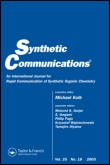
SYNTHETIC COMMUNICATIONS
Pioneering Discoveries in Synthetic MethodologiesSynthetic Communications, published by Taylor & Francis Inc, stands as a pivotal resource in the field of organic chemistry since its inception in 1971. With an ISSN of 0039-7911 and an E-ISSN of 1532-2432, this journal has established a commendable reputation, holding a Q3 ranking in organic chemistry by 2023, reflecting its contributions to the discipline and positioning it within the 50th percentile according to Scopus rankings. Targeted towards researchers, professionals, and students alike, Synthetic Communications aims to disseminate significant advancements in synthetic methodologies and reactions, facilitating the exchange of innovative ideas and enhancing collaborative efforts in the scientific community. Although not an open-access journal, it offers a wealth of valuable research content that is crucial for anyone dedicated to pushing the boundaries of organic chemistry.
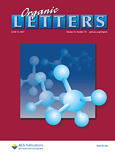
ORGANIC LETTERS
Leading the Charge in Organic Chemistry InnovationOrganic Letters is a leading peer-reviewed journal dedicated to the rapid dissemination of research in the field of organic chemistry. Published by the American Chemical Society, this esteemed journal has been an invaluable resource for researchers and professionals since its inception in 1999, featuring research articles that contribute significantly to the understanding of organic synthesis and related disciplines. With its impressive impact factor, it is currently ranked in the top quartile (Q1) across multiple categories, including Biochemistry, Organic Chemistry, and Physical and Theoretical Chemistry, showcasing its influence in the scientific community. The journal's commitment to quality is underscored by its high rankings in Scopus, placing it among the top tier of journals in its categories. While not an open-access journal, Organic Letters offers exceptional access options for institutions and individuals seeking cutting-edge research. As it continues to evolve towards its convergence year of 2024, it remains the go-to publication for innovative findings and methodologies in organic chemistry.
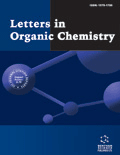
LETTERS IN ORGANIC CHEMISTRY
Bridging Research and Practice in Organic ChemistryLETTERS IN ORGANIC CHEMISTRY is a distinguished journal published by Bentham Science Publishers Ltd, focusing on the rapidly evolving field of organic chemistry. Established in 2005, the journal commits itself to disseminating vital research findings, reviews, and innovative methodologies that contribute to the understanding and advancement of organic chemistry and biochemistry. With an ISSN of 1570-1786 and an E-ISSN of 1875-6255, this journal enhances accessibility and visibility for authors and readers alike, albeit not adopting an open-access model. Positioned within Q4 quartile rankings for both Biochemistry and Organic Chemistry, it serves a niche audience keen on exploring emerging trends and breakthroughs in these disciplines. Its Scopus rankings further reflect its role in the global academic landscape, albeit at the beginning stages of its impact journey. Based in the United Arab Emirates, LETTERS IN ORGANIC CHEMISTRY is dedicated to fostering dialogue among researchers and practitioners, paving the way for future innovations in organic and biochemical sciences.

RUSSIAN JOURNAL OF ORGANIC CHEMISTRY
Fostering Knowledge in Organic Chemistry DynamicsRUSSIAN JOURNAL OF ORGANIC CHEMISTRY, published by MAIK NAUKA/INTERPERIODICA/SPRINGER, stands as a pivotal resource in the realm of organic chemistry, catering to an audience of researchers, professionals, and students keen on the latest advancements in this dynamic field. With an ISSN of 1070-4280 and E-ISSN of 1608-3393, this journal has been a fixture in academic literature since its inception in 1996 and continues to play a significant role as it converges towards 2024. Despite currently holding a Q4 ranking in organic chemistry and a modest placement in the Scopus ranks, the journal offers valuable insights and contributions that reflect the ongoing research and trends within the discipline. Though it does not operate under an open access model, the journal provides essential studies and reviews that enhance scientific dialogue and innovation. Located in the United States, the journal supports the advancement of organic chemistry, fostering a deeper understanding of complex chemical interactions and methodologies.
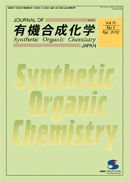
JOURNAL OF SYNTHETIC ORGANIC CHEMISTRY JAPAN
Pioneering research in the heart of organic synthesis.JOURNAL OF SYNTHETIC ORGANIC CHEMISTRY JAPAN, published by the SOCIETY OF SYNTHETIC ORGANIC CHEMISTRY, JAPAN, is an esteemed publication specializing in the dynamic field of organic chemistry. With a rich history dating back to 1944, this journal aims to disseminate pivotal research findings and innovative methodologies in synthetic organic chemistry, fostering collaboration and knowledge exchange among researchers and professionals. Although it currently holds a modest ranking in the Q4 quartile for organic chemistry, its commitment to advancing the discipline remains steadfast. The journal primarily caters to scholars and students seeking to delve deeper into organic synthesis, highlighting original articles, reviews, and methodological studies. While access to the journal is not open, its contributions to the field are essential for anyone invested in understanding the complexities of organic chemistry. We invite you to explore the journal's offerings and enhance your expertise in synthetic organic processes.

BIOORGANIC & MEDICINAL CHEMISTRY LETTERS
Advancing the frontiers of medicinal chemistry.BIOORGANIC & MEDICINAL CHEMISTRY LETTERS, published by PERGAMON-ELSEVIER SCIENCE LTD, is a leading journal in the fields of biochemistry, drug discovery, and medicinal chemistry, designed to disseminate significant advances in these disciplines. Established in 1991, the journal spans various important categories, including Organic Chemistry and Pharmaceutical Science, with its 2023 Scimago Journal Rank placing it at Q2 in Organic Chemistry and Q3 in several other relevant fields. Though not an open-access publication, it provides invaluable insights into contemporary research and innovative methodologies, appealing to researchers, professionals, and students alike. The journal's commitment to quality and relevance makes it a vital resource for those aiming to stay at the forefront of bioorganic and medicinal chemistry developments. For more information, please visit the journal's website as it remains a critical platform for scholarly exchange, particularly for those engaged in interdisciplinary research.